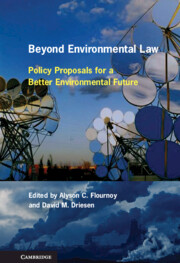Book contents
- Frontmatter
- Contents
- List of Figure and Tables
- About the Contributors
- Preface
- Acknowledgments
- Part I National Environmental Legacy Act
- 1 The Case for the National Environmental Legacy Act
- 2 The Necessity of Procedural Reform
- 3 Shifting Baselines and Backsliding Benchmarks: The Need for the National Environmental Legacy Act to Address the Ecologies of Restoration, Resilience, and Reconciliation
- 4 Valuing Nature: The Challenge of the National Environmental Legacy Act
- 5 Citizen Science and the Next Generation of Environmental Law
- 6 Creating National Environmental Legacy Act Information: The Double Standard
- 7 The Constitution and Our Debt to the Future
- Part II Environmental Competition Statute
- Index
- References
5 - Citizen Science and the Next Generation of Environmental Law
Published online by Cambridge University Press: 05 June 2012
- Frontmatter
- Contents
- List of Figure and Tables
- About the Contributors
- Preface
- Acknowledgments
- Part I National Environmental Legacy Act
- 1 The Case for the National Environmental Legacy Act
- 2 The Necessity of Procedural Reform
- 3 Shifting Baselines and Backsliding Benchmarks: The Need for the National Environmental Legacy Act to Address the Ecologies of Restoration, Resilience, and Reconciliation
- 4 Valuing Nature: The Challenge of the National Environmental Legacy Act
- 5 Citizen Science and the Next Generation of Environmental Law
- 6 Creating National Environmental Legacy Act Information: The Double Standard
- 7 The Constitution and Our Debt to the Future
- Part II Environmental Competition Statute
- Index
- References
Summary
IF THE NATIONAL ENVIRONMENTAL LEGACY ACT IS TO SET ACCUrate baseline measures of the quantity and quality of our natural resources, whose information should be included in the establishment and monitoring of these environmental metrics? This chapter argues that the Legacy Act should pay attention to where the law might cultivate a more active citizenry by enlisting citizen volunteers in the collection and diffusion of environmental data and the public education about environmental quality. One approach to cultivating such an active citizenry is through public participation in various forms of citizen science. By “citizen science,” we mean projects involving citizen volunteers in the collection, analysis, and interpretation of data through which the public becomes more engaged in federal research and decision making. Citizen science programs can increase the amount of information about the ecological condition of local resources, support data sharing for community education, build networks, leverage local resources, and help provide information to motivate local civic conservation action. In turn, participation in the collection and discussion of environmental data creates opportunities for the publicity necessary to cultivate a more active and informed citizenry. In addition, citizen science can create informal social pressure for regulatory compliance and provide support for agency and citizen enforcement efforts.
To develop the benefits of active participation and citizen science, this chapter draws on the political philosophy of Hannah Arendt. Hannah Arendt focused on the importance of active citizenship in society, arguing active involvement yields citizens with the capacity for effective political participation.
- Type
- Chapter
- Information
- Beyond Environmental LawPolicy Proposals for a Better Environmental Future, pp. 109 - 128Publisher: Cambridge University PressPrint publication year: 2010
References
- 1
- Cited by

